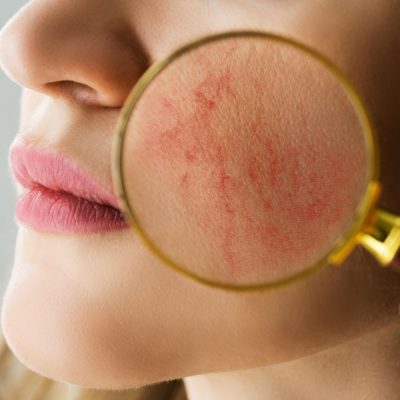Rosacea
Rosacea is a chronic (long-term) skin condition primarily affecting the face. It causes redness, visible blood vessels and at times acne-like bumps. A proper diagnosis is critical as it is often mistaken for acne or an allergic reaction. However, it is a distinct condition requiring specific care. At SkinAccess Clinics, we offer comprehensive, personalized treatment plans to help manage rosacea and improve your skin’s appearance.

What is Rosacea?
Rosacea is a chronic condition typically affecting the central part of the face, including the cheeks, nose, chin and forehead. It is characterized by flare-ups and remissions, where symptoms may worsen for weeks or months on end and then diminish before reappearing. It most commonly affects adults over the age of 30 and more frequently occurs in individuals with fair skin. Rosacea can affect anyone, but is more prevalent in women, particularly during menopause.
Symptoms of Rosacea
Symptoms of rosacea can vary significantly between patients. However, some common symptoms include
Facial Redness
One hallmark symptom of rosacea is persistent redness, particularly in the central part of the face. The redness may resemble a blush or sunburn that does not fade.
Visible Blood Vessels
Small blood vessels on the nose and cheeks often become visible.
Bumps & Pimples
Acne-like breakouts can occur, but unlike acne, rosacea does not typically cause blackheads or whiteheads.
Thickened Skin
Over time, the skin can tend to thicken, especially around the nose.
Eye Irritation
Rosacea patients commonly experience eye symptoms like irritation, dryness and swollen, red eyelids.
Causes of Rosacea
The exact cause of rosacea is unknown; however, it is believed to be caused by a combination of genetic, vascular and environmental factors.
A family history of rosacea could increase the likelihood of developing it.
Abnormalities in the facial blood vessels may contribute to redness and visible blood vessels.
According to some studies, it is believed that an overactive immune response may play a role in the development of rosacea.
Factors such as sun exposure, hot or cold weather, stress, spicy foods, alcohol and even certain skincare products are known to trigger or worsen rosacea symptoms.

Diagnosis of Rosacea
Rosacea is diagnosed based on the appearance of the skin and symptoms described by the patient. Hence, a proper examination and patient history is important and is performed by a dermatologist. This helps to rule out other conditions with similar symptoms like acne, allergic reactions or lupus.
Management and Treatment of Rosacea
There is no known cure for rosacea, however, a variety of treatment options are available to manage its symptoms and prevent flare-ups. At SkinAccess Clinics, we offer a range of effective, personalized treatment options that include the following
➥ Topical Medications: Prescription creams or gels help reduce inflammation, redness and acne-like breakouts.
➥ Oral Medications: Oral antibiotics may be prescribed to treat moderate to severe rosacea or ocular rosacea.
➥ Skincare Recommendations: Daily sunscreen use and gentle skincare products are essential for managing rosacea. Patients should avoid the use of harsh scrubs, alcohol-based toners and other irritants that can cause the symptoms to worsen.
➥ Lifestyle Modifications:It is important to identify and avoid triggering factors to prevent flare-ups. These triggering factors vary from individual to individual. Stress management should also be practised as they are beneficial
